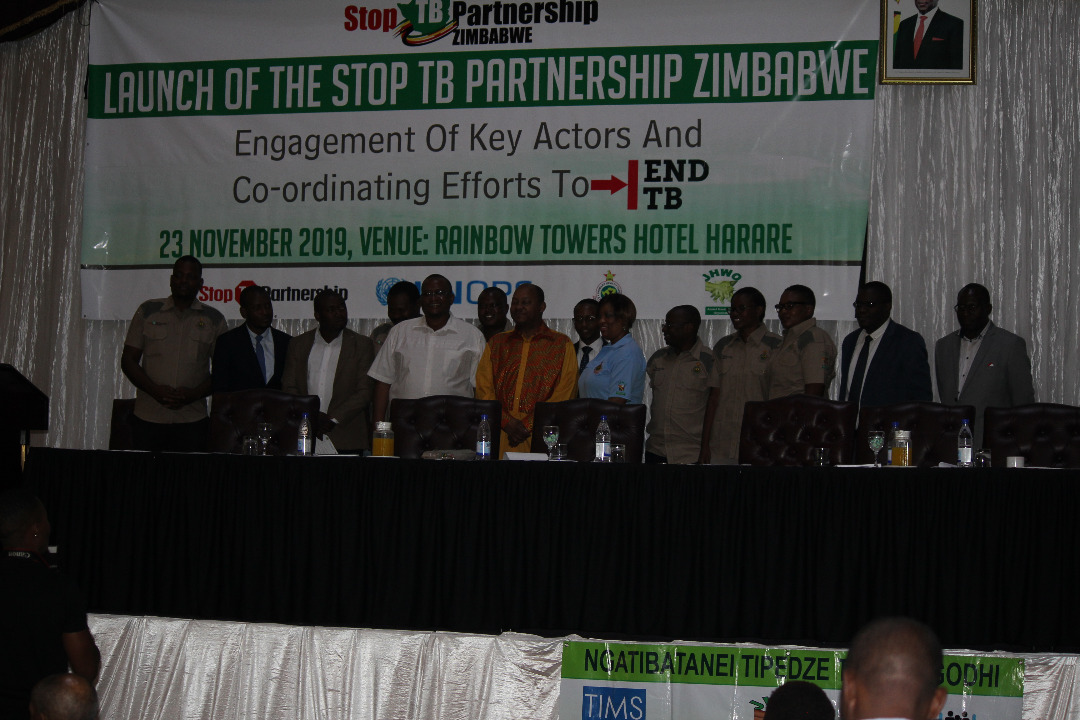By Joyce Mukucha
In an effort to end Tuberculosis(TB)as well well as advocating for political commitment to ensure that TB remains on top of the national agenda, the Stop TB Partnership Zimbabwe has joined hands with Stop TB Partnership Geneva and several key actors in stepping up the fight to mitigate the disease in the country.
The organisation also partnered with the Ministry of Health and Child Care in launching the Stop TB Zimbabwe programme in the mining sector so as to guarantee advocacy against harmful norms and mitigating the impact of the disease in the sector.
Zimbabwe remains one of the top 8 countries in Africa on world’s top 30 list of TB/HIV.
Speaking on behalf of the First Lady Auxillia Mnangagwa on the launch of the Stop TB Partnership Zimbabwe,the Minister of Health and Child Care Dr Obadiah Moyo said collaboration and coordination efforts were needed to scale up measures of ending TB in Zimbabwe.
He indicated that Zimbabwe was making strides in as much as ending TB is concerned. However, there was need to scale up the efforts by coming in with new effective mechanisms that lead to a harm and disease free society especially the mining industry.
“As Government, we are geared to make Vision 2030 a reality by ensuring that Key Population Organisations are roped in the journey of culminating TB in the mining sector. Zimbabwe is at 83% and a lot still needs to be done to improve and reach at least 90%.
“To the TB in the Mining Sector in Southern Africa (TIMS), I urge you to work hard pertaining ending TB in the mining sector and I urge funders to continue extending support and taking action in eradicating this burden in our country. As we launch this programme, we strive to close the gaps of undetected cases in various communities,” he said.
The Stop TB Partnership Zimbabwe Chairperson Mr Ronald Rungoyi emphasised that health facilities needed to be jealously guarded to prevent new infections. He said continuous investment towards new technology was imperative in eradicating TB. Nutritious food such as fruits and vegetables, he said, were recommended in protecting and preventing TB.
“We want to knock out TB in our nation therefore it is critical to have advanced technology so as to have continuous research to ensure that important information is captured and quickly disseminated. As we want to leave no one behind, there is need to continue pushing and fighting against TB.
The Southern Africa is rich in minerals and has fast growing industry however the workers are at high risk of being affected by TB therefore there was need for regionally coordinated response.
Mr Rungoyi added that it was important to mainstream ambitious targeting and focus on neglected risk groups and TB preventive therapy interventions. He reiterated that there was need for more innovation and implementations to reduce stigma, create demand, reduce the problem of missed cases and improve treatment outcomes.
In the Phase 2 of fighting TB in the mining sector in Southern Africa (TIMS), there are 3 Sub-Sub Recipients which were selected. These include Bekezela Home Based Care, Ex-Wenela Miners Association of Zimbabwe and Jointed Hands Welfare Organisation (JHWO). The implementation of programmes for these districts will run until December 2020 with Bekezela targeting case finding target on Hurungwe (786) and 198 on Bubi.
Giving an overview of the National TB Response, Dr Charles Sandy highlighted that over the years, Zimbabwe has made progresses in combating TB. However, he indicated that although the numbers of incidences were declining, the cases of children diagnosed remains at 5 percent and a lot still needs to be done so that it scales up to about 10 to 15 percent.
“There is rapid decline in number of cases in incidences in the range of 5 to 10 percent. Zimbabwe is one of the countries that have managed to reach 80% in as much as fighting TB is concerned and this has been achieved through early detection. In line with this, concerted effort is needed to have a significant number of diagnosed children to ensure continued success. No one should be left behind.
“Treatment outcomes indicate that there is continuous improvement. I hail the support that we continue to receive from major partners which include Global Fund, USAID and WHO among other key funders,” said Dr Sandy.
Stop TB Partnership Zimbabwe is a voluntary alliance of organisations and people from different sectors of society who commit to work collaboratively towards ending TB in the country. It was formed under the National TB and Leprosy Program in the Ministry of Health and Child Care with initial support from Global Fund and USAID Challenge TB. Subsequent support came from the Stop TB Partnership Geneva which led to the launch in November 2019.
